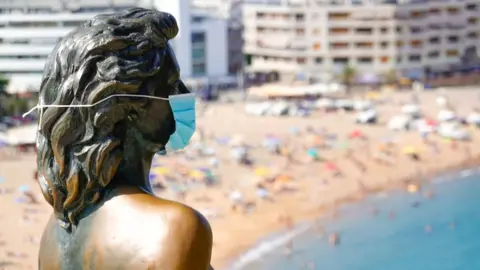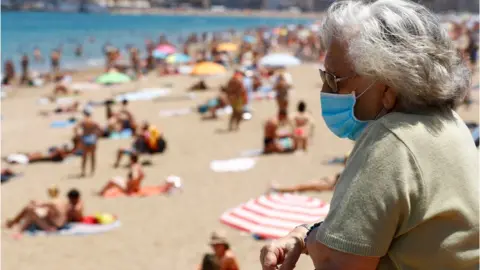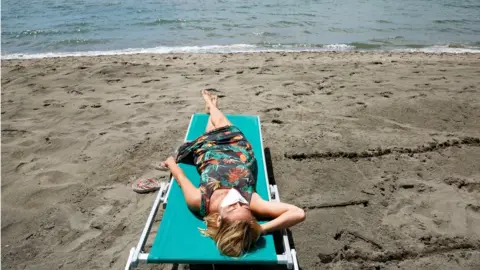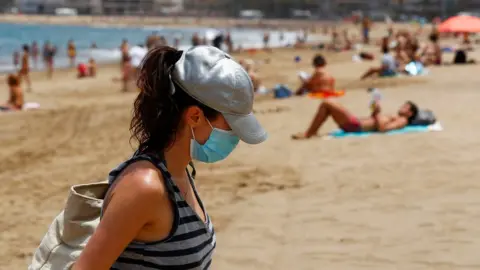Coronavirus: How to stay cool in a face mask as hot UK weather forecast
 EPA
EPAIt is going to be sweltering.
You don't really need the TV weather maps turning red to realise that much of the UK is going to be roasting in temperatures above 30C. But as you slip on your favourite summer top and shorts, you may break out in a hot sweat... as you realise you are also likely to be enduring part of your day in a face mask.
Keeping cool while wearing a facial covering might be more difficult, but we've gathered some tips.
Choose the right mask
"We have all got to wear masks here, but there's a few things you can do," says consultant dermatologist Dr Adil Sheraz, who works at a London NHS hospital.
The top tip for him is to choose a mask made from a breathable material, such as cotton or even bamboo.
He says although surgical masks - the thin, blue masks that many people are seen wearing - provide protection from spreading the virus, they aren't that breathable and "they are not the best to use for keeping cool".
But he adds that one downside to cotton masks is that they absorb more fluid and can get damp - so he suggests taking a spare out on hot days.
The colour of the mask might also help. "Consider having a mask that's a lighter colour, rather than a darker one," says Dr Sheraz. Dark colours absorb more light, converting it into heat.
 EPA
EPAWhat about putting your mask in the freezer before you head out in the heat? Dr Sheraz is unconvinced. "It's not a bad idea. The only thing I was thinking about is you don't want people get cold burns on their faces. So I don't think I'd advise that."
Dr Anil Budh-Raja, a GP who also offers skin and cosmetic treatments at clinics in Birmingham and Chiswick, suggested a towel which has been put in the freezer could be used as a mask.
The government says a face covering can be anything which safely the covers the nose and mouth - but of course you must be able to tie it in place. Remember that public towel slips are always embarrassing in the summer heat.
Change what you put on your skin
"The other thing you want to do is try and avoid make-up," says Dr Sheraz, as it can mix with sweat and clog pores. "Use sun block and a water based moisturiser."
Dr Budh-Raja also echoes the need to apply sun cream, as the Met Office forecasts high UV levels in some areas.
"You can still get UVA and UVB rays through a mask," he says "Put [sun cream] on and wear a mask on top," he said. "It won't clog up if you use the right one."
 Reuters
ReutersDr Budh-Raja suggested putting some hyaluronic acid serum on the face "which helps keep moisture in the skin". "Refrigerate it and you can put in on, that will keep you cool for a while," he said.
Is a visor advisory?
Of course many people have invested in a full facial shield, instead of or as well as wearing a mask.
But if you've joined the agents of shield, remember that they are generally held in place by a headband worn bang against your forehead, which is just about the slippiest and sweatiest part of your face on a hot day.
So remove the whole contraption and mop your brow occasionally.
Above all, stay hydrated
It's all well and good having the handy bottle of water to hand but if you're steadfastly not taking any liquid on board because you are keeping your mouth covered, you may end up in danger from dehydration.
There is no problem removing your mask to have a refreshing glug of cool water - just remember to gel your hands before touching your mask and aim to remove it when you are at a safe distance from others.
Other small changes can also keep you cooler overall, Dr Sheraz suggests.
He says people should plan activities for the times of the day when it is cooler, as well as wearing a hat.
He adds that masks are already more common in some Asian countries that experience hot weather, so maybe we should borrow a tip from some of the people who live there and carry a battery-powered fan.
 Reuters
ReutersJohns Hopkins University also advises anyone who feels lightheaded, dizzy or is finding it harder to breathe to get out of the heat.
And it warns: "How someone will respond to heat stress while wearing a mask depends on a combination of the intensity of the heat, duration of exposure and any underlying medical condition.
"Regardless of the type of mask, don't try to make your face feel cooler by dousing the mask in water. Getting face coverings wet can compromise their filtration capabilities."
